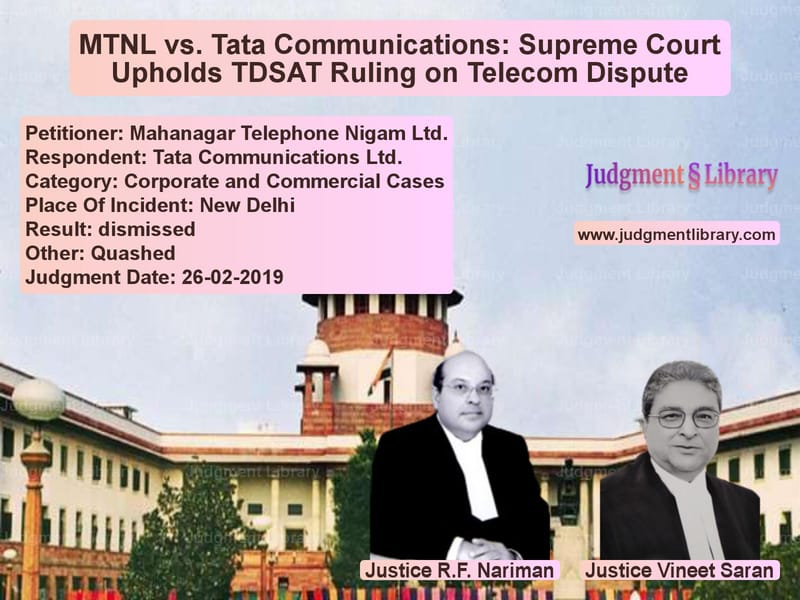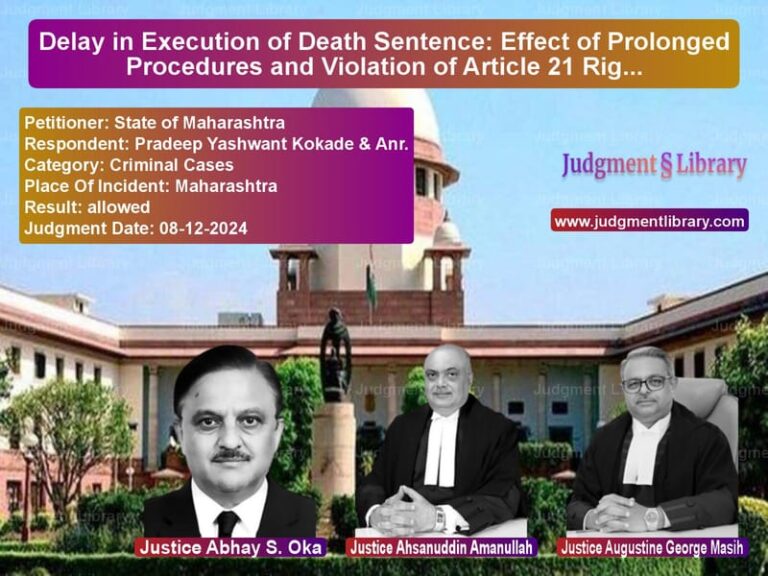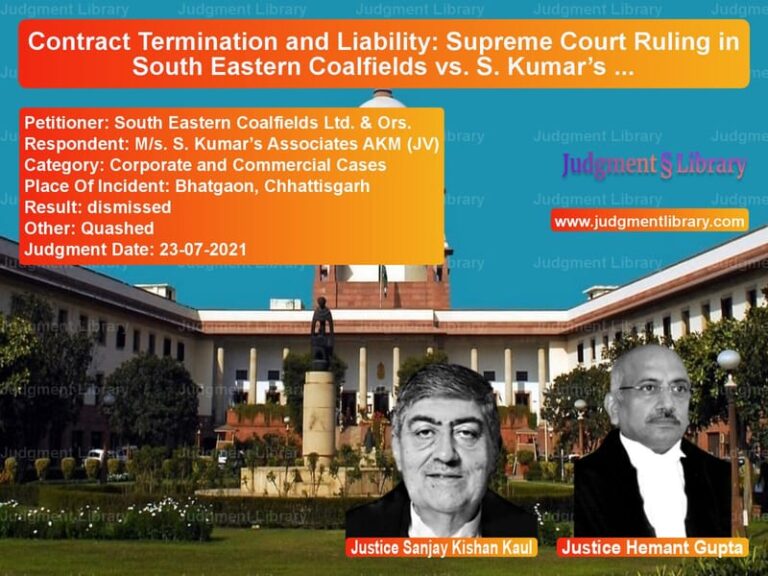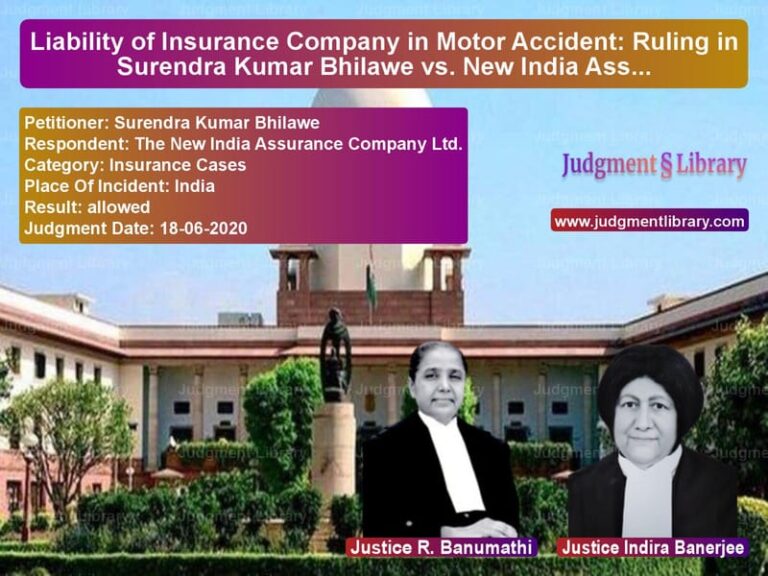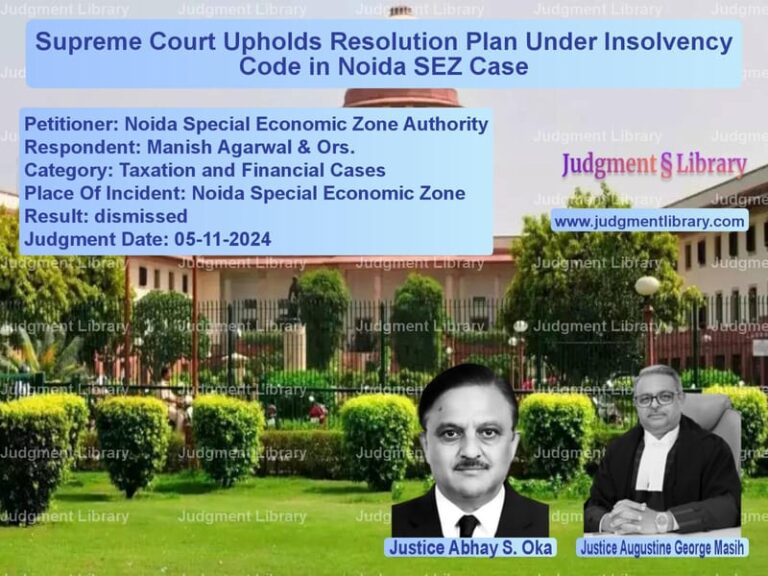MTNL vs. Tata Communications: Supreme Court Upholds TDSAT Ruling on Telecom Dispute
The case of Mahanagar Telephone Nigam Ltd. (MTNL) vs. Tata Communications Ltd. is a significant ruling by the Supreme Court of India regarding disputes under the Telecom Regulatory Authority of India Act, 1997. The dispute involved a claim for the recovery of outstanding dues and the legality of unilateral deductions by MTNL. The case clarifies the scope of contractual obligations, liquidated damages, and the role of Section 70 of the Indian Contract Act, 1872.
Background of the Case
The dispute arose from a purchase order dated October 1, 2008, between Tata Communications Ltd. (TCL) and MTNL. The purchase order required TCL to provide bandwidth services, including last-mile connectivity, to MTNL. However, the project faced delays due to alleged inaccessibility to MTNL’s premises. MTNL unilaterally deducted an amount of Rs. 1,10,57,268 from the dues payable to TCL, prompting the latter to file a petition before the Telecom Disputes Settlement and Appellate Tribunal (TDSAT).
Key Legal Issues
- Was MTNL justified in making unilateral deductions from TCL’s payments?
- Could TCL claim reimbursement under Section 70 of the Indian Contract Act, 1872?
- Did MTNL have the right to impose additional penalties beyond the stipulated liquidated damages under the purchase order?
Arguments Before the Supreme Court
Appellant (MTNL) Arguments
- MTNL argued that TCL failed to provide last-mile connectivity within the stipulated period.
- Since the connectivity was not established, MTNL suffered losses, justifying the deductions.
- The claim for reimbursement under Section 70 of the Indian Contract Act was not valid because a contractual relationship existed between the parties.
Respondent (TCL) Arguments
- TCL contended that it faced delays due to MTNL’s failure to provide access to its premises.
- MTNL’s unilateral deduction was arbitrary and beyond the contractual provisions.
- The purchase order had a liquidated damages clause (capping damages at 12% of the contract value), and MTNL had exceeded this limit.
TDSAT’s Ruling
The TDSAT ruled in favor of TCL, holding that:
- MTNL’s deductions were arbitrary and not in accordance with the purchase order.
- The liquidated damages clause in the contract capped MTNL’s liability at 12% of the contract value.
- MTNL was directed to refund Rs. 84,74,087 to TCL, along with interest at 9% per annum.
Supreme Court’s Observations and Judgment
1. Unilateral Deductions Are Not Permissible
The Supreme Court held that MTNL had no authority to unilaterally impose penalties beyond the agreed liquidated damages. The Court stated:
“Since the contract provides for liquidated damages, any additional deduction beyond the contractual limit is impermissible.”
2. Rejection of Section 70 of the Indian Contract Act Claim
The Supreme Court clarified that Section 70 of the Indian Contract Act applies only where there is no contract. Since TCL and MTNL had a binding agreement, quantum meruit (compensation for non-gratuitous acts) was not applicable.
3. Liquidated Damages Clause is Binding
The Court emphasized that the contract explicitly capped damages at 12%. Any further deductions were beyond MTNL’s rights. It reaffirmed the principle that liquidated damages clauses are binding unless shown to be unreasonable or arbitrary.
4. Upholding TDSAT’s Order
The Supreme Court found no reason to interfere with TDSAT’s well-reasoned decision. It upheld the refund of Rs. 84,74,087 to TCL, along with interest.
Final Judgment
The Supreme Court:
- Dismissed MTNL’s appeal and upheld TDSAT’s order.
- Confirmed the refund of Rs. 84,74,087 to TCL.
- Reaffirmed the liquidated damages cap at 12% of the contract value.
- Clarified that quantum meruit claims under Section 70 do not apply when a valid contract exists.
Legal Implications of the Judgment
This ruling has far-reaching implications for contractual disputes in the telecom sector:
- Restricting Unilateral Deductions: Parties cannot impose penalties beyond what is contractually agreed.
- Enforceability of Liquidated Damages Clauses: Courts will uphold contractual provisions limiting damages.
- Limited Scope of Section 70 of the Contract Act: Quantum meruit cannot override an existing contract.
- Strengthening the Role of TDSAT: Reinforces the tribunal’s authority in resolving telecom disputes.
Conclusion
The Supreme Court’s ruling in MTNL vs. Tata Communications Ltd. upholds contractual discipline by reaffirming that liquidated damages clauses must be respected. The decision prevents telecom operators from imposing arbitrary penalties and strengthens the enforceability of commercial contracts. This judgment is a vital precedent for businesses engaged in telecom and infrastructure projects, ensuring clarity in contractual obligations and dispute resolution mechanisms.
Petitioner Name: Mahanagar Telephone Nigam Ltd..Respondent Name: Tata Communications Ltd..Judgment By: Justice R.F. Nariman, Justice Vineet Saran.Place Of Incident: New Delhi.Judgment Date: 26-02-2019.
Don’t miss out on the full details! Download the complete judgment in PDF format below and gain valuable insights instantly!
Download Judgment: Mahanagar Telephone vs Tata Communications Supreme Court of India Judgment Dated 26-02-2019.pdf
Direct Downlaod Judgment: Direct downlaod this Judgment
See all petitions in Contract Disputes
See all petitions in Corporate Compliance
See all petitions in Judgment by Rohinton Fali Nariman
See all petitions in Judgment by Vineet Saran
See all petitions in dismissed
See all petitions in Quashed
See all petitions in supreme court of India judgments February 2019
See all petitions in 2019 judgments
See all posts in Corporate and Commercial Cases Category
See all allowed petitions in Corporate and Commercial Cases Category
See all Dismissed petitions in Corporate and Commercial Cases Category
See all partially allowed petitions in Corporate and Commercial Cases Category

